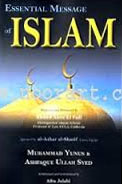
By Muhammad Yunus & Ashfaque Ullah Syed
22 May, 2015
7. THE BROADER NOTION OF DIN AL-ISLAM
There can be no debate that din al-Islam is the religion of the followers of the Prophet Muhammad: Islam. However, the Qur’an also uses the generic word Islam, and its different roots, and the word Din, with various shades of meaning. Thus the Qur’an uses the word ‘din’ to denote judgment (1:4), divine law (2:193), law (of the land) (12:76), obedience or devotion (39:3), faith, religion, moral responsibility (107:1), religion in the conventional sense (110:2) etc. Based on these Qur’anic illustrations, the term Din would appear to embrace the broader notion of obedience (to God) or compliance (with God’s commandments), as against religion in its popular sense.1
The Qur’an uses the word Islam (root – SLM) in noun and verb forms with the connotation of orienting, submitting, surrendering, or committing oneself to God or to be at peace with God.2 The Qur’an further declares:
“Indeed! Whoever commits (asslama) his whole being [lit., face] to God, and does good deeds - will get his reward from his Lord. There will be no fear upon them nor shall they grieve.” (2:112).
“And who can be better in faith (din) than the one who orients (asslama) his whole being [Lit., face] to God, and does good deeds, and follows the way of Abraham, the upright one, and God took Abraham as a friend” (4:125).
“And who is finer in speech than the one who invites to God, does good deeds and says: ‘I am of those who submit to God (muslimun)’” (41:33).
In these verses, the Qur’an attributes the quality of doing good deeds to those who submit, or orient themselves to God (asslama, muslim).
7.1. Service to Humanity as the Essence of Din Al-Islam
Combining the foregoing underlined Qur’anic notions of i) din (primarily as obedience or devotion), and ii) the verb and noun forms of Islam (asslama, muslim), din al-Islam may be connoted with a faith system that calls for orienting oneself (asslama) to God for the doing of good deeds, or serving humanity. Accordingly the Qur’an describes ‘din al-Islam’, as the universal faith that was enjoined on earlier prophets, who were all true muslims (2:131-133), 3 and conveyed the same essential message.
“When his Lord said to him (Abraham), ‘Submit (aslim)’, he said, ‘I submit (aslamtu) to the Lord of the worlds’ (2:131). Abraham enjoined his sons to do so, as did Jacob: ‘O my sons, God has chosen the religion (din) for you; so you should not die unless you have submitted (Muslimoun)’ (132). Were you witnesses when death came to Jacob? He said to his sons, ‘What will you serve after I am gone?’ They said, ‘We will serve your God; the God of your fathers, Abraham, Ishmael, and Isaac - the One God; and to Him we have truly submitted (muslimun)’” (2:133).
As if to leave no ambiguity on the cardinal significance of obedience to God through service to humanity, the Qur’an devotes a whole chapter to it:
“Do you see the one who belies the din (religion) (107:1)?. It is he who rebuffs the orphan (2), and does not encourage feeding the poor (3). So, woe to those prayerful (4), who are heedless of their prayer (5), who aim to be seen (in public) (6), but hold back from helping (others)” (107:7).
Muslims ardently believe in the ‘five pillars’ and are very particular to comply with them, but they are by and large not pro-active in serving humanity as required by their faith.
7.2. Corroboration from Islamic and Secular Sources
The foregoing exercise is no window dressing. Many eminent scholars of Islam, Muslims as well as non-Muslims, have acknowledged the pivotal role of service to humanity in Islam, as illustrated by the following quotations:
• “The essence of Islam is to serve God and to do good to your fellow creature.” - Abdullah Yusuf Ali4
• “To do the good in conviction or Iman (true faith in One God) is the noblest form of worship that any rational creature can offer to God.”- Husayn Haykal5
• “A Muslim is one who surrenders his or her whole being to the Creator. At first however, the believers called their religion ‘Tazaqqa’. This is an obscure word, which is not easy to translate. By cultivating ‘Tazaqqa’, Muhammad’s converts were to cloak themselves in the virtues of compassion and generosity; they were to use their intelligence to cultivate a caring and responsible spirit, which made them want to give graciously of what they had to all God’s creatures.”- Karen Armstrong6
Notes
1. Abdullah Abbas Nadwi, Vocabulary of the Holy Qur’an, Chicago 1983, p. 196.
2. 3:19, 3:52, 3:64, 3:80, 3:83
3. 3:52, 28:52/53.
4. Abdullah Yusuf Ali, The Holy Qur’an, Lahore 1934, reprinted, Maryland 1983, note 550.
5. Muhammad Husayn Haykal, The Life of Muhammad, English translation by Ismail Ragi, 8th edition, Karachi 1989, p. 56.
6. Karen Armstrong, Muhammad, London 1991, p. 97. An early Qur’anic passage (92:17-21) brings across the notion of Tazaqqa implicit in the noted quotation.
[6 references]
Muhammad Yunus, a Chemical Engineering graduate from Indian Institute of Technology, and a retired corporate executive has been engaged in an in-depth study of the Qur’an since early 90’s, focusing on its core message. He has co-authored the referred exegetic work, which received the approval of al-Azhar al-Sharif, Cairo in 2002, and following restructuring and refinement was endorsed and authenticated by Dr. KhaledAbou El Fadl of UCLA, and published by Amana Publications, Maryland, USA, 2009.




 Categories :
Categories :  Moderate Islamist here
Moderate Islamist here


0 comments:
Post a Comment